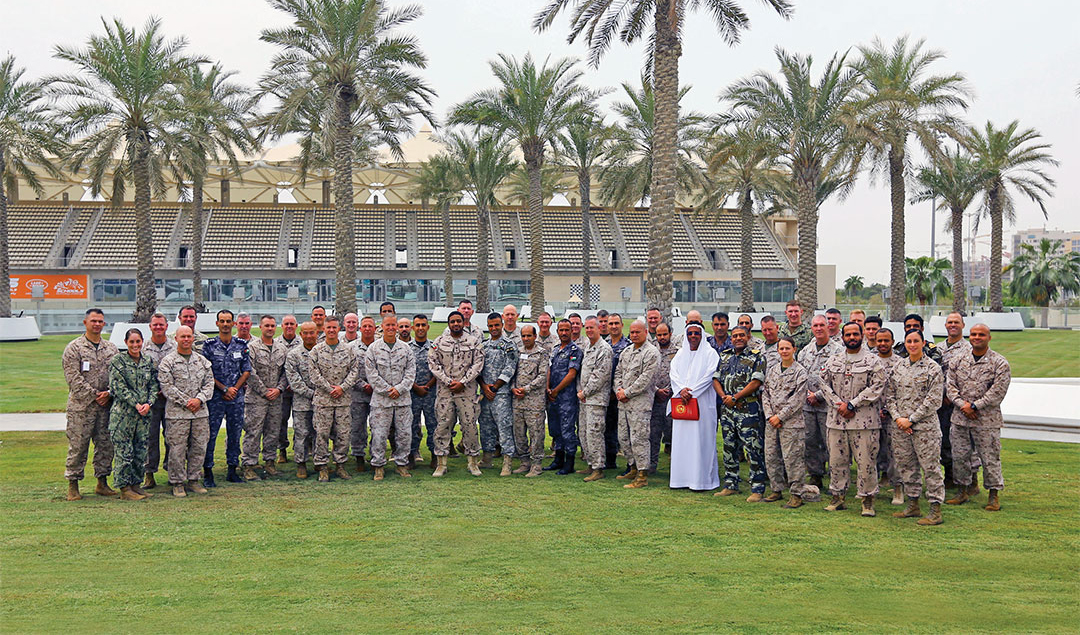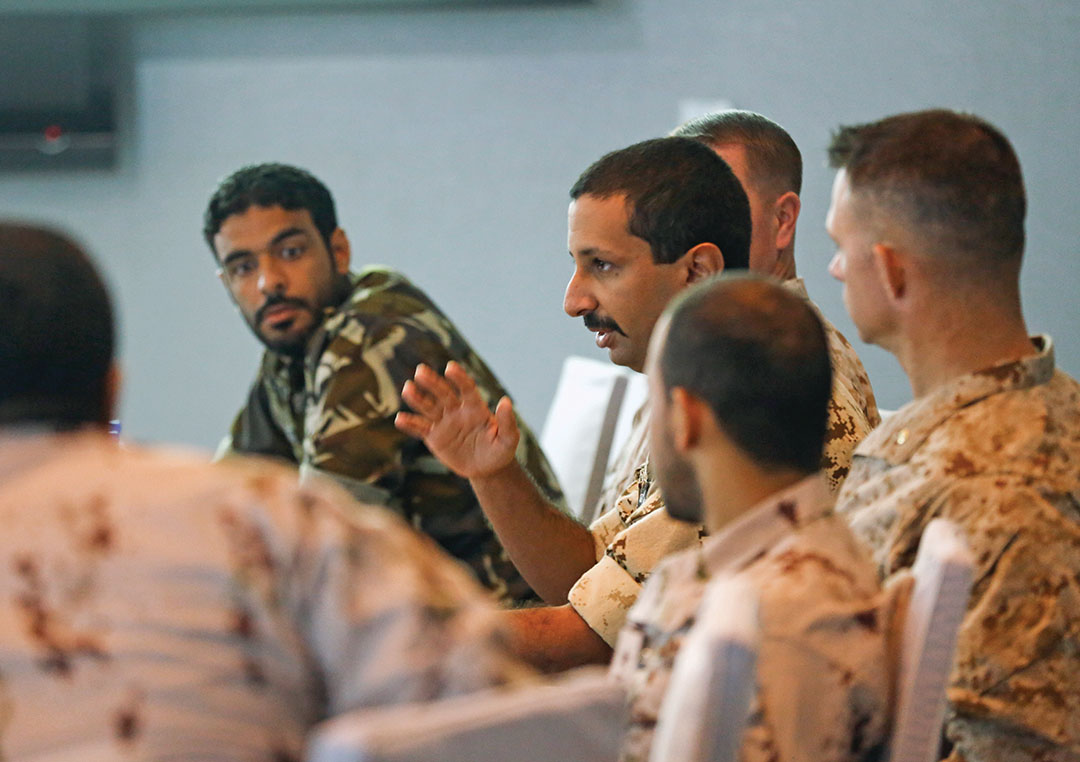Middle Eastern Marines gather at the Regional Marine Symposium in Abu Dhabi
UNIPATH STAFF
The Middle East offers no shortage of arenas in which regional marine forces are necessary. These specialized troops — traditionally adept at operations on both land and sea — have played a critical role in protecting strategic waterways stretching from the Arabian Gulf to the Red Sea to the Suez Canal.
Houthi attacks on Red Sea shipping near Yemen, instability in Syria, drug and weapons smuggling, Somali-based piracy: All require regional marine forces committed to a high state of readiness.
With those common security challenges in mind, officers and noncommissioned officers from Bahrain, Jordan, Lebanon, Oman, Saudi Arabia, the United Arab Emirates (UAE) and the United States converged on Abu Dhabi, UAE, in August 2018 for the third annual Regional Marine Symposium.
The discussion topics included a full range of security threats, and each country had something unique to add to the symposium:

The United Arab Emirates Presidential Guard, which co-hosted the event with U.S. Marine Corps Forces Central Command (MARCENT), noted how its forces employ lessons learned from fighting in Yemen to improve its training.
Emirati officers described forces that initially lacked morale and endurance for a long fight and equipment that performed less than perfectly in Yemen’s rough, mountainous terrain.
Complicating operations further, the Yemeni battlefields potentially included three different enemies: Iranian-sponsored Houthi, al-Qaida in the Arabian Peninsula and Daesh.
Lt. Col. Omar Al Mazraa remarked that his units feel an obligation to ensure Yemeni civilians are protected from the ravages of civil war.
“We are doing our best and making sure aid and support are being received by Yemeni civilians and not by other groups,” Lt. Col. Al Mazraa said.
Jordan
Jordanian Marines experienced growing pains of their own. Established in 2006 at the naval base of Aqaba, Jordan’s 77th Royal Marine Battalion has been building proficiency, most recently under its new commander, Lt. Col. Mutasim Al-Rabie.
The battalion is gradually staffing and equipping a quick reaction force capable of responding almost instantly to crises and, in addition to its duties defending Jordan, hopes to supply manpower to United Nations peacekeeping forces overseas.
To improve performance, Lt. Col. Mutasim maintains an office to gather lessons learned from his troops, lessons ultimately shared with other branches of the Jordan Armed Forces.
“If we have 85 percent success, we focus on the 15 percent that went wrong,” Lt. Col. Mutasim said.
Oman
Cmdr. Talal Al Zaabi, a ship’s captain in the Royal Navy of Oman, cited criminals as the most persistent threat to his country’s 3,100-kilometer coastline, part of which commands the Strait of Hormuz.
Piracy, overfishing, illegal immigration and narcotics and weapons smuggling are among the top threats. As the closest wealthy country to Somalia, Oman suffered disproportionately from piracy during the peak of the problem from 2008 to 2011, Cmdr. Al Zaabi said.
The sultanate divides its coast into four defensive sectors, each with its own command center, ships, aircraft and special operations forces. But Oman regards the protection of Hormuz as a special case requiring broader military support.
“The Strait of Hormuz is not just Oman’s responsibility. It’s the responsibility of the whole world,” Cmdr. Al Zaabi said.

Lebanon’s Marines are independent of the nation’s Navy and play a large role in protecting the country’s 210-kilometer coast. Several years ago, when an Ethiopian Airlines planes crashed in the Mediterranean, it was Marines who retrieved the black box from the bottom of the sea.
Lebanon’s Marines include a highly trained special forces unit modeled on the U.S. Navy’s SEALs. When Daesh attempted to create an “emirate” in northern Lebanon in 2014, Marines helped crush the invasion.
In the future, Lebanon’s Marines will be tasked with protecting future oil drilling platforms off the country’s Mediterranean coast.
“Lebanon has a great experience in combating extremists coming from Syria, as we shared our experience with attendees so that they can take advantage of the lessons,” said Capt. Ali Mazen of Lebanon. “We also hope to benefit from the experiences of countries involved in the fight against terrorism, smuggling and piracy.”
Saudi Arabia
Bracketed by two of the world’s most strategic waterways — the Arabian Gulf and the Red Sea — Saudi Arabia’s Royal Marines include two brigades of six companies each. One brigade is based at Western Fleet headquarters in Jeddah, the other at Eastern Fleet headquarters in Jubail.
Protecting the Saudi coastline and islands — and the Navy ships that patrol those waters — is the force’s main mission.
“Our main task is to defend the kingdom’s seacoasts,” Saudi Royal Navy Staff Col. Bander Naser Almakhlifi said. “The ability to move and deploy rapidly is our defining responsibility.”
Since the Royal Marines are a relatively new force — established in 1979 — they continue to train with partners such as Egypt, Jordan, Pakistan and the United States.
Bahrain
As a small island nation, Bahrain relies on partnerships to secure its coastline. The country’s Armed Forces have welcomed assistance from Gulf Cooperation Council partners.
It also hosts ships from the United States, Great Britain and other coalition partners to respond to any trouble that emerges in the Arabian Gulf.
Bahrain has installed a new system that requires all vessels to identify themselves electronically to the Bahrain Coast Guard.
“We have a big problem with the smuggling of weapons to terrorist groups,” Bahraini Maj. Nayaf Ibrahim Al-Khalifa said. “We use visit, board, search and seizure tactics not only for inspection but to deter smugglers and force them to keep their distance from our coastline.”
Future cooperation
There is no question about the U.S. commitment to its Middle Eastern partners, but the defeat of Daesh makes it likely that U.S. leaders will steer more military resources to the Pacific region, U.S. Marine Corps Brig. Gen. Matthew Trollinger told symposium participants.
That means Middle Eastern governments must increase cooperation and assume a greater share of the region’s defense. It was a theme embraced further by MARCENT Commander Lt. Gen. Carl Mundy.
He praised the UAE for taking security into its own hands when it felt threatened by terrorists and rebels operating in Yemen. But he cautioned that Middle Eastern security depends on more than just military force.
He urged leaders from the region to focus equally on nonmilitary efforts — social, economic and religious — to lessen the appeal of violent extremist organizations. The U.S. will support its partners in this effort.
“We’re trying to help you to solve your own problems,” Gen. Mundy said.

